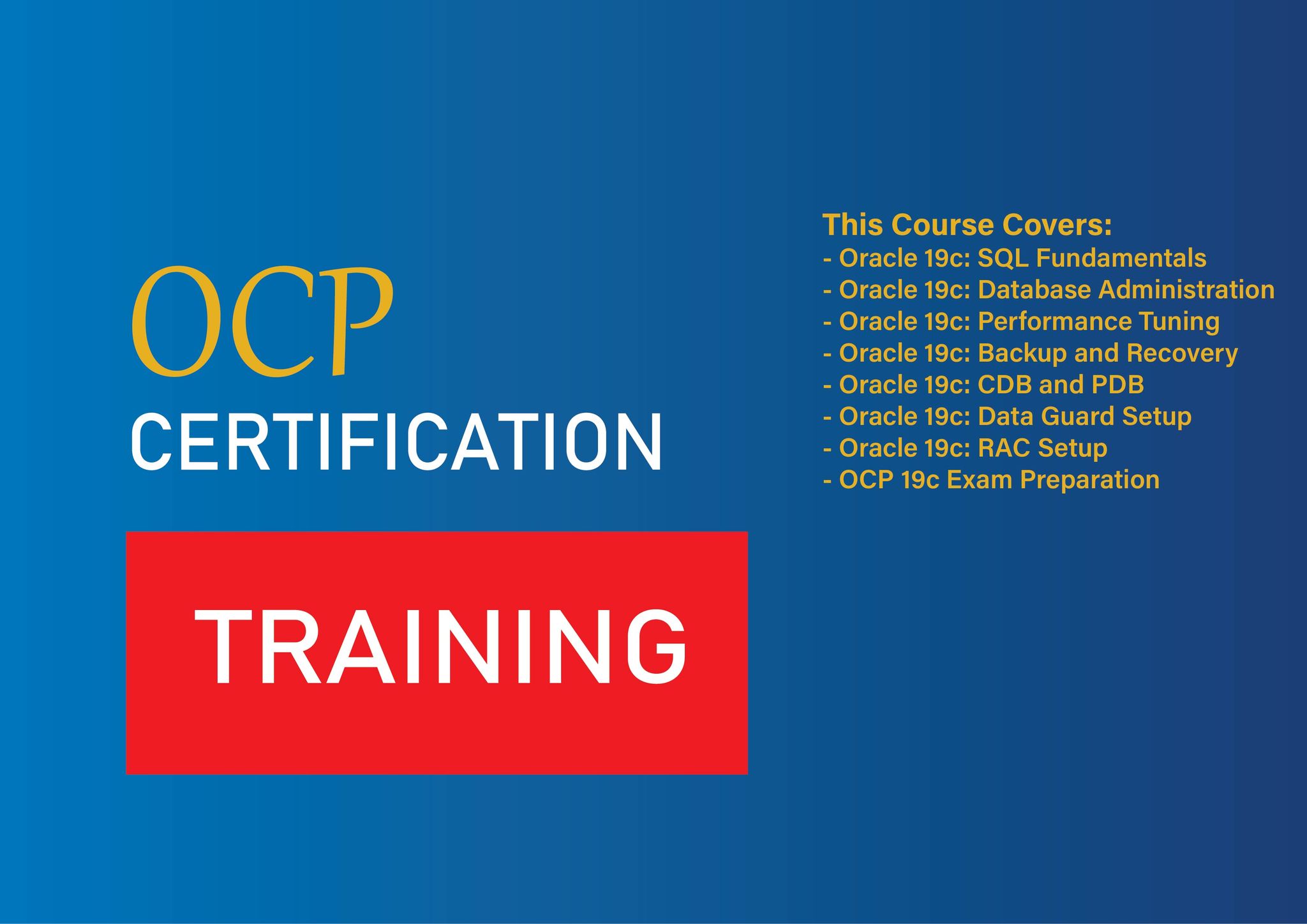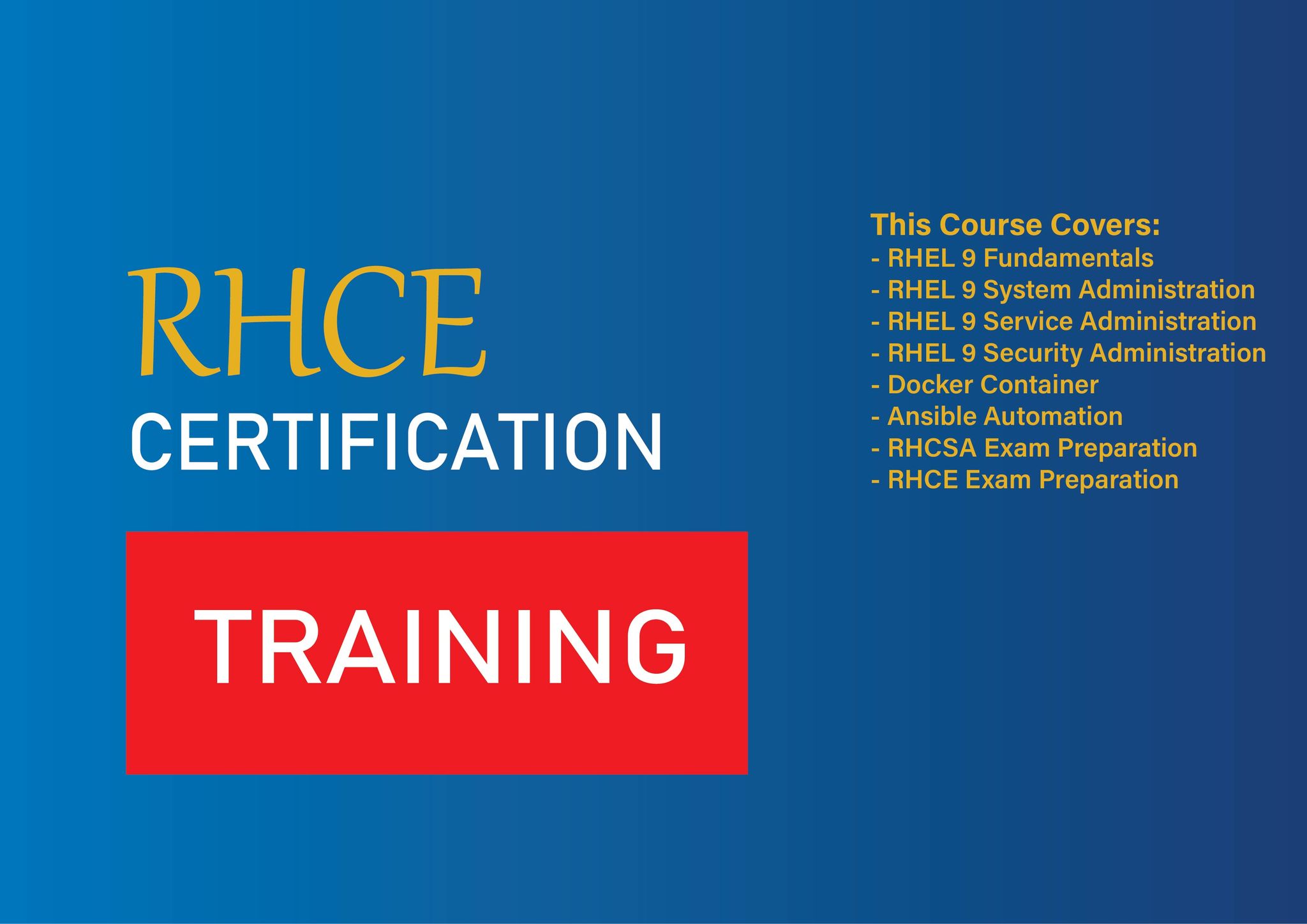Oracle Database 19c DBA (OCA+OCP) Training

| Date | Duration | Time | Discount | Actual Price | Our Price | |
|---|---|---|---|---|---|---|
| May 27 | 72 Hours | 06:00 AM | Call or email | Call or email | Call or email |
Oracle Database 19c Administration course prepares students to become a professional Oracle Database Administrator (DBA). This course also prepares students for Oracle Certified Associate (OCA)& Oracle Certified Professional (OCP) certification Exams. This course begins from scratch and gradually takes to a professional level. This is an extensive course to learn Oracle Database Administration in depth. We assure that after taking this course, students will be able to work for Level 1 to Level 3 Oracle DBA jobs. The course syllabus has been divided into nine modules.
In first module, Linux Fundamentals & Installing Oracle Database 19c Software, students learn installing Linux operating system, fundamental Linux commands, installing Oracle database 19c software and using different tools to access an Oracle database. Linux has been added as an additional part in this course because Oracle database runs on Linux/Unix platform in most of the companies.
In the second module, Oracle Database 19c SQL Fundamentals, students learn how to retrieve data using SQL SELECT statement, restrict and sort data, use single-row functions to customize output, use conversion functions and conditional expressions, manage data in different time zones, report aggregated data and use group functions, display data from multiple tables using joins, use subqueries to solve queries, use set operators, manage tables using DML statements, manage schema objects, manage views, manage sequences, synonyms and indexes.
In the third module, Oracle Database 19c Administration, students learn about Oracle database architecture, accessing an Oracle database, managing database instances, managing tablespaces and datafiles, managing undo, managing users roles and privileges, managing storage, configuring Oracle net services & moving data.
In the fourth module, Oracle Database 19c Backup and Recovery, students learn backup strategies and terminology, restore and recovery concepts, using flashback technologies, duplicating a database, configuring and using RMAN, diagnosing failures, performing recovery, transporting data & RMAN troubleshooting and tuning.
In the fifth module, Oracle Database 19c Advanced Backup and Recovery, students learn how to setup and configure Real Application Cluster (RAC) and Oracle Data Guard.
In the sixth module, Oracle Database 19c Deploy, Patch and Upgrade, students learn installing grid infrastructure and oracle database, installing grid infrastructure for a standalone server, patching grid infrastructure and oracle database, upgrading to Oracle grid infrastructure, creating an Oracle database by using DBCA, Oracle database 19c new features, Oracle restart & upgrading the Oracle database.
In the seventh module, Oracle Database 19c New Features for Administration, students learn using general overall database enhancements, using availability enhancements & using diagnostibility enhancements.
In the eight module, Oracle Database 19c Container Database(CDB) & Pluggable Database (PDB), students learn creating CDBs and regular PDBs, managing CDBs and PDBs, backup and duplicate database, recovery and flashback, upgrading and transporting CDBs and PDBs, managing application PDBs & managing security in multitenant databases.
In the ninth and last module, Oracle Database 19c Performance Tuning, students learn installing and using Oracle enterprise manager cloud control, monitoring and tuning database performance & tuning SQL statements.
To reinforce learning and evaluate understanding, students are given assignments after each unit. At the end of each module, students have to take a live practical test. These assignments and practical tests prepare them to crack interview, manage real time system as well as make them confident to attend the Oracle Certified Associate (OCA) exam.
Fundamentals of Big Data, Data Warehouse, Data Science & NoSQL has been recently added into the course syllabus.
The assignments and tests are prepared in such a way that it prepares the students to work in production environment, succeed in the interviews and pass the certification exams.
Module-I: Linux Fundamentals & Installing Oracle Database 19c Software
-
Installing Linux Operating System
-
Installing Virtualization Software
-
Creating a Virtual Machine
-
Installing Linux Operating System (for Oracle Database)
-
Fundamental Linux Commands
-
Linux Basic Commands
-
Creating Users and Groups
-
Granting Permissions on a File and Directory
-
Installing Packages
-
Defining Variables
-
Basic Network Configuration
-
Installing Oracle Database 19c Software
-
Preparing Linux before Installing Oracle Database software
-
Installing Oracle Database 19c Software
-
Accessing an Oracle Database Using Different Tools
-
Using SQL Plus
-
Using SQL Developer
-
Test 1
-
Module-I Test
Module-II: Oracle Database 19c SQL Fundamentals (OCA)
-
Retrieving Data using the SQL SELECT Statement
-
Using The SQL SELECT statement
-
Using Column aliases
-
Using The DESCRIBE command
-
Using concatenation operator, literal character strings, alternative quote operator, and the DISTINCT keyword
-
Using Arithmetic expressions and NULL values in the SELECT statement
-
Restricting and Sorting Data
-
Applying Rules of precedence for operators in an expression
-
Limiting Rows Returned in a SQL Statement
-
Using Substitution Variables
-
Using the DEFINE and VERIFY commands
-
Using Single-Row Functions to Customize Output
-
Manipulating strings with character functions in SQL SELECT and WHERE clauses
-
Performing arithmetic with date data
-
Manipulating numbers with the ROUND, TRUNC and MOD functions
-
Manipulating dates with the date function
-
Managing Data in Different Time Zones
-
Working with CURRENT_DATE, CURRENT_TIMESTAMP,and LOCALTIMESTAMP
-
Working with INTERVAL data types
-
Reporting Aggregated Data Using Group Functions
-
Restricting Group Results
-
Creating Groups of Data
-
Using Group Functions
-
Using Subqueries to Solve Queries
-
Using Single Row Subqueries
-
Using Multiple Row Subqueries
-
Displaying Data from Multiple Tables Using Joins
-
Using Self-joins
-
Using Various Types of Joins
-
Using Non equijoins
-
Using OUTER joins
-
Using SET Operators
-
Matching the SELECT statements
-
Using the ORDER BY clause in set operations
-
Using The INTERSECT operator
-
Using The MINUS operator
-
Using The UNION and UNION ALL operators
-
Managing Tables using DML statements
-
Managing Database Transactions
-
Using Data Manipulation Language
-
Controlling transactions
-
Managing Schema Objects
-
Creating and using temporary tables
-
Managing constraints
-
Managing Views
-
Managing Views
-
Managing Sequences, Synonyms, Indexes
-
Managing Indexes
-
Managing Synonyms
-
Managing Sequences
-
Test 2
-
Module-II Test
Module-III: Oracle Database 19c Administration (OCA)
-
Understanding Oracle Database Architecture
-
Understanding Oracle Database Instance Configurations
-
Understanding Oracle Database Memory and Process Structures
-
Understanding Logical and Physical Database Structures
-
Understanding Oracle Database Server Architecture
-
Accessing an Oracle Database
-
Using the Database Configuration Assistant (DBCA)
-
Using Oracle Enterprise Manager Cloud Control
-
Using Oracle Enterprise Manager Database Express
-
Managing Database Instances
-
Starting Up Oracle Database Instances
-
Using Data Dictionary Views
-
Shutting Down Oracle Database Instances
-
Using Dynamic Performance Views
-
Using the Automatic Diagnostic Repository (ADR)
-
Using the Alert Log and Trace Files
-
Managing Initialization Parameter Files
-
Managing Tablespaces and Datafiles
-
Viewing Tablespace Information
-
Creating, Altering and Dropping Tablespaces
-
Managing Table Data Storage
-
Implementing Oracle Managed Files
-
Moving and Renaming Online Data Files
-
Managing Undo
-
Understanding Transactions and Undo Data
-
Storing Undo Information
-
Configuring Undo Retention
-
Comparing Undo Data and Redo Data
-
Understanding Temporary Undo
-
Managing Users, Roles and Privileges
-
Assigning Quotas to Users
-
Applying the Principal of Least Privilege
-
Creating and Assigning Profiles
-
Administering User Authentication Methods
-
Managing Oracle Database Users, Privileges, and Roles
-
Managing Storage
-
Managing Resumable Space Allocation
-
Shrinking Segments
-
Deferring Segment Creation
-
Using Space-Saving Features
-
Deploying Oracle Database Space Management Features
-
Managing Different Types of Segments
-
Using Table and Row Compression
-
Understanding Block Space Management
-
Configuring Oracle Net Services
-
Using Oracle Net Services Administration Tools
-
Configuring Communication Between Database Instances
-
Configuring the Oracle Net Listener
-
Connecting to an Oracle Database Instance
-
Comparing Dedicated and Shared Server Configurations
-
Administering Naming Methods
-
Moving Data
-
Using External Tables
-
Using Oracle Data Pump
-
Using SQL*Loader
-
Test 3
-
Module-III Test
Module-IV: Oracle Database 19c Backup & Recovery (OCP)
-
Backup Strategies and Terminology
-
Perform Full and Incremental Backups and Recoveries
-
Compress and Encrypt RMAN Backups
-
Use Media Manager
-
Create a Multi-Section Backups of Very Large Files
-
Create Duplexed Backup Sets
-
Create Archival Backups
-
Backup of Recovery Files
-
Backup Non Database Files
-
Backup ASM Meta Data
-
Restore and Recovery Concepts
-
Employee the Best Oracle Database Recovery Technology for Your Failure Situation
-
Describe and Use Recovery Technology for Crash, Complete, and Point-in-Time Recovery
-
Using Flashback Technologies
-
Configure your Database to Support Flashback
-
Perform Flashback Operations
-
Duplicating a Database
-
Creating a Duplicate Database
-
Configuring and Using RMAN
-
Configure RMAN and the Database for Recoverability
-
Configuring and Using an RMAN Recovery Catalog
-
Diagnosing Failures
-
Detect and Repair Database and Database Block Corruption
-
Diagnosing Database Issues
-
Performing Recovery
-
Restore and Recover Database for Recoverability
-
Perform Non-RMAN Database Recovery
-
Transporting Data
-
Transport Data
-
RMAN Troubleshooting and Tuning
-
Interpret the RMAN message output
-
Diagnose RMAN performance issues
-
Test 4
-
Module-IV Test
Module-V: Oracle Database 19c Advanced Backup and Recovery (Additional Module)
-
Real Application Cluster (RAC)
-
Install Grid Infrastructure and Oracle Database
-
Setup Oracle Real Application Cluster (RAC)
-
Oracle Data Guard
-
Installing and Configuring Oracle Data Guard
-
Test 5
-
Module-V Test
Module-VI: Oracle Database 19c Deploy, Patch and Upgrade
-
Install Grid Infrastructure and Oracle Database
-
Install Grid Infrastructure for a Standalone Server
-
Install Oracle Database Software
-
Install Grid Infrastructure for a Standalone Server
-
Rapid Home Provisioning
-
Patching Grid Infrastructure and Oracle Database
-
Patch Grid Infrastructure and Oracle Database
-
Upgrading to Oracle Grid Infrastructure
-
Upgrade Oracle Grid Infrastructure
-
Creating an Oracle Database by Using DBCA
-
Create, Delete and Configure Database Using DBCA
-
Oracle Database 18c: New Features
-
Image and RPM based Database Installation
-
Oracle Restart
-
Configure and Use Oracle Restart to Manage Components
-
Upgrade the Oracle Database
-
Plan for Upgrading an Oracle Database
-
Upgrade an Oracle Database
-
Perform Post-Upgrade Tasks
-
Test 6
-
Module-VI Test
Module-VII: Oracle Database 19c New Features for Administrators
-
Using General Overall Database Enhancements
-
Install Oracle Database Software
-
Create, Delete and Configure Database Using DBCA
-
Creating CDBs and Regular PDBs
-
Use Miscellaneous 19c New Features
-
Using Availability Enhancements
-
Use an RMAN Recovery Catalog
-
Use Flashback Database
-
Using Diagnostibility Enhancements
-
Use new Diagnostibility Features
-
Test 7
-
Module-VII Test
Module-VIII: Oracle Database 19c Container Database-CDB & Pluggable Database-PDB (OCP)
-
Creating CDBs and Regular PDBs
-
Configure and create a CDB
-
Create a new PDB from the CDB seed
-
Explore the structure of PDBs
-
Manage CDBs and PDBs
-
Manage PDB service names and connections
-
Manage startup, shutdown and availability of CDBs and PDBs
-
Change the different modes and settings of PDBs
-
Evaluate the impact of parameter value changes
-
Performance management in CDBs and PDBs
-
Control CDB and PDB resource usage with the Oracle Resource Manager
-
Backup and Duplicate Database
-
Perform Backup and Recover CDBs and PDBs
-
Duplicate an active PDB
-
Duplicate a Database
-
Recovery And Flashback
-
Restore and Recovering Databases with RMAN
-
Perform CDB and PDB Flashback
-
Upgrading and Transporting CDBs and Regular PDBs
-
Upgrade an Oracle Database
-
Transport Data
-
Manage Application PDBs
-
Explain the purpose of application root and application seed
-
Define and create application PDBs
-
Install, upgrade and Patch applications
-
Create and administer Application PDBS
-
Clone PDBs and Application containers
-
Plug and unplug operations with PDBs and application containers
-
Comparing Local Undo Mode and Shared Undo Mode
-
Manage Security in Multitenant databases
-
Manage Security in Multitenant databases
-
Manage PDB lockdown profiles
-
Audit Users in CDBs and PDBs
-
Manage other types of policies in application containers
-
Test 8
-
Module-VIII Test
Module-IX: Oracle Database 19c Performance Tuning (OCP)
-
Installing and Using Oracle Enterprise Manager Cloud Control
-
Limitations of Oracle Enterprise Manager Database Express
-
Installing Oracle Enterprise Manager Cloud Control
-
Managing Oracle Databases Using OEM Cloud Control
-
Monitoring and Tuning Database Performance
-
Managing Memory Components
-
Understanding The Automatic Workload Repository (AWR)
-
Understanding The Advisory Framework
-
Monitoring Wait Events, Sessions, and Services
-
Managing Metric Thresholds and Alerts
-
Understanding and Using The Performance Tuning Methodology
-
Performing Performance Planning
-
Understanding The Automatic Database Diagnostic Monitor (ADDM)
-
Tuning SQL Statements
-
Understanding The Oracle Optimizer
-
Using The SQL Tuning Advisor
-
Managing Optimizer Statistics
-
Using The SQL Access Advisor
-
Test 9
-
Module-IX Test
Module-X: Additional Topics
-
Fundamentals of Big Data
-
Fundamentals of Data Warehouse
-
Fundamentals of Data Science
-
Fundamentals of NoSQL
Who should take this course?
Anyone who wants to build career as an Oracle DBA can attend this training.
What are the prerequisites for taking up this course?
As we start the course from scratch, anyone with basic knowledge of computer can join the course.
What is special about training from Professional IT Solution?
Our main strength is our long training experience and quality of our training. We have been producing skilled IT man power over a decade. Our trainer has more than 2 decade of training experience. Another major advantage is the quality of our training. We assure you that you’ll enjoy our training sessions.
How do you make participants ready for cracking interview and get jobs?
We engage our students with assignments that asks them to implement real time tasks which will make them confident to reply to the interviewers and handle their production servers when get selected.
Do you prepare students for taking up certification exams?
Yes, we take special exam preparations classes.
Do you also help your students in finding jobs?
Yes, of course! As large number of companies contact us for providing our skilled students for their job vacancies. So, we forward our students’ resume to the companies based on their skill match. But they have to crack interview to get selected. As during the training session we prepare our students with the possible questions/scenarios during interview, most of them crack interview successfully.
Do you Provide certificate after course completion?
Yes, we provide certificate of course completion. There should be at least 70% attendance in the class and should obtain at least 70% marks in the comprehensive test to obtain certificate of attendance.
What is success rate of your students in the Exam?
Almost 100% students (who appeared the exam) have passed their exam with excellent score.
What is the placement status of your students?
Almost 100% students have got placement.
What types of companies have you served?
Many renowned banks, telecoms, software companies and government organizations.
Oracle Database Administration I: Exam Number: 1Z0-082
-
Format: Multiple Choice
-
Duration: 150 Minutes
-
Number of Questions: 90
-
Passing Score: 60%
An Oracle Database Administration 2019 Certified Professional has proven theoretical understanding of and the practical skills required to configure and manage Oracle Databases up to and including Oracle 19c. Passing this first exam in the two exam path proves your skills in SQL programming skills, database and network administration.
Oracle Database Administration II: Exam Number: 1Z0-083
-
Format: Multiple Choice
-
Duration: 150 Minutes
-
Number of Questions: 85
-
Passing Score: 57%
An Oracle Database Administration 2019 Certified Professional has proven theoretical understanding of and the practical skills required to configure and manage Oracle Databases up to and including Oracle 19c. Passing this second exam in a two exam path proves your skills in: installation, upgrades, patching, SQL programming skills, database and network administration and backup and recovery. This person also demonstrates fluency with some advanced skills such as multi-tenant, SQL performance monitoring and problem determination.
Global IT Certifications
Oracle Database
-
OCA [Oracle Certified Associate]
-
OCP [Oracle Certified Professional]
RHCI [Red Hat Certified Instructor]
Linux
-
RHCSA [Red Hat Certified System Administrator]
-
RHCE [Red Hat Certified Engineer]
OpenStack Cloud
-
RHCSA [Red Hat Certified OpenStack Administrator]
Ansible Automation
-
RHCS-Ansible [RedHat Certified Specialist in Ansible Automation]
VMware Datacenter
-
VCP [VMware Certified Professional]
Advanced IT Trainings
-
DevOps Professional (Git, Jenkins, Maven, Docker Container, Kubernetes, OpenShift, Ansible, Cloud, Nagios, Terraform)
-
Oracle RAC, Data Guard, Golden Gate & PT
-
Big Data, Data WareHouse, Data Science, NoSQL
-
Linux Server Hardening
Experience
-
20 Years of Training experience.
-
Trained 400+ batches (DevOps, Oracle Database, Linux, Ansible , OpenStack, VMware)
-
The Most Experienced Red Hat Trainer in Nepal
-
Trained large number of IT Professionals from many renowned national & international organizations (Govt. Organizations, Telecoms, Banks, IT Companies, Colleges, etc.)
-
Worked as consultant in many organizations
This is instructor led live virtual class.
Self-paced videos are available for self-learners.
Our assignments and tests prepares students for real-time work.
After completing this training, students become ready to take Oracle’s certification exams (OCA & OCP).
We have both the regular weekdays classes as well as long hour weekend classes.
We provide support to our students in the case of any technical issues.


